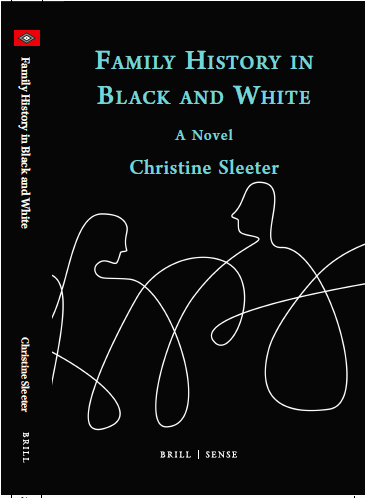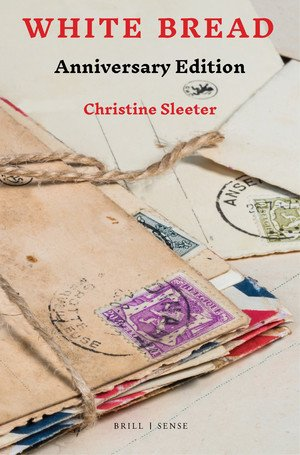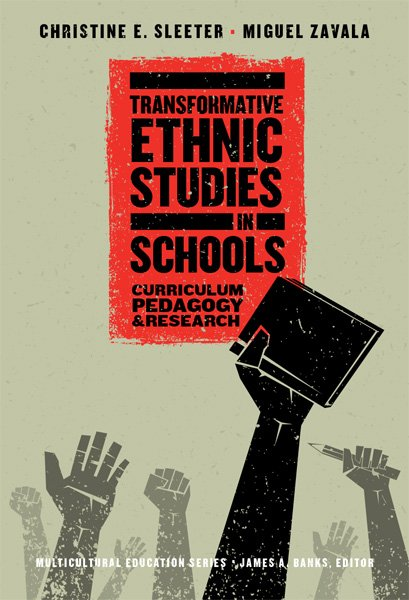Christine Sleeter
Fiction Books
Family History in Black and White
Christine Sleeter (2021). Brill|Sense
Within today’s rapidly shifting racial demographics, knowing who to trust can be risky. Family History in Black and White traces two competitors for the prestigious position of school superintendent. One is white and one is Black; both are urban high school principals. Ben, who had been bullied as a child, craves public recognition but, unsure whether he can trust today’s competitive process to be fair to a white man, wrestles with compromising his own integrity to get what he wants. Roxane, who has navigated racism all her life, craves recognition of her humanity, but can’t be sure which of the professionals around her are actually trustworthy, including her chief competitor, Ben. In the end, both must ultimately reckon with the reverberations of a surprising twist in their histories.
Readers of my previous novel White Bread will enjoy catching up with Esteban, now a high school principal and colleague of Roxane's.
Christine Sleeter is both a teacher who writes and a writer who teaches. Her newest novel is a rich text, a work of fiction that can teach all of its readers—including scholars and teacher practitioners—about the work of teaching and about race and racism.
Simona Goldin, University of North Carolina Chapel Hill
Set in Northern California, Christine Sleeter’s follow up to White Bread (her first novel), Family History in Black and White stitches together poignant examples of the real and realistic struggles of educators trying to do the right thing while confronting their own implications in a broader racialized history. Her protagonists, Ben and Roxane, show us that racism is both intimate and universal, dispiriting while providing the condition for a refusal of despair. Weaving together stories of love and heartbreak, family life and institutions, Sleeter not only engages our politics but stokes our imagination for a better education and a more just future.
Zeus Leonardo, author of Race Frameworks: A Multidimensional Theory of Racism and Education
It’s hard to say which narrative twist is more compelling: the one in which Christine Sleeter genre-jumps with inspiring finesse and dexterity or the one that darn near jumped from the page in the second half of Family History in Black and White. Read this book and, like me, enjoy both twists at once.
Paul Gorski, author of
Reaching and Teaching Students in Poverty
Family History in Black and White is a primer for anyone who wants to learn about history, race, gender, school dynamics, teaching, curriculum, ethnic studies, urban school reform, and so much more. This novel is full of intellectual ideas but does what a university textbook, academic book, or research article cannot. It offers a provocative, page-turning plot that will pull you in, even as it teaches you about some of the most intractable problems found in society and schools today. I cannot wait to use this in my graduate course!
Keffrelyn D. Brown, Professor and Distinguished University Teaching Professor, The University of Texas at Austin
Christine Sleeter, a trusted voice in educational research, uses the art of the novel to center critical issues in education. Through Roxane and Ben, relatable characters who come from different backgrounds, but whose lives are surprisingly intertwined, the reader is reminded of the costs of personal ambition in a system that doesn't always play fair. Through stories revealing the complicated nature of their present and past lives, the book critiques the inequitable systems we all live within; takes on gentrification and bias, and lays out a history absent from most of today’s classrooms. All at once, Family History in Black and White reveals the need for historical literacy, the lasting impact of generational trauma, and serves as a reminder of our pasts while offering hope for our future.
Yolanda Sealey-Ruiz, Teachers College, Columbia University and author of Love from the Vortex & Other Poems
Christine Sleeter's brilliant novel takes up issues of trust, educational leadership, and racism in America's public schools--topics that usually appear only in educational texts. It makes a compelling case that we need trust. With racial dynamics engrossing the world's imagination, this riveting novel will forever shift your views on race and education.
Muhammad Khalifa, President of the Culturally Responsive School Leadership Institute
White Bread, Anniversary Edition
Christine Sleeter (2020). Brill|Sense
In White Bread, readers accompany Jessica on a journey into her family’s past, into herself, and into the bicultural community she teaches but does not understand. Jessica, a White fifth-grade teacher, is prompted to explore her family history by the unexpected discovery of a hundred-year-old letter. Simultaneously, she begins to grapple with culture and racism, principally through discussions with a Mexican American teacher.
White Bread pulls readers into a tumultuous six months of Jessica’s life as she confronts many issues that turn out to be interrelated, such as why she knows so little about her family’s past, why she craves community as she feels increasingly isolated, why the Latino teachers want the curriculum to be more Latino, and whether she can become the kind of teacher who sparks student learning.
Alternating between past and present, the story acquaints readers with German American communities in the Midwest during the late 1800s and early 1900s through portraits based on detailed historic excavation. What happened to these communities gives Jessica the key to unlock answers to questions that plague her.
Read about how you might use White Bread in college courses.
In this anniversary edition, Christine Sleeter again draws from years of invaluable experience relevant to teaching and racial justice: as a classroom teacher, as a teacher educator, and as a white person committed to continual racial self-examination and anti-racist practice. White Bread weaves history and analysis into compelling narrative to illustrate how white teachers are complicit in institutional racism, and how they can interrupt it.
Robin DiAngelo author of White Fragility
Absolutely enthralling! In White Bread, be prepared for exquisite storylines and compelling characters -- a century apart but woven together seamlessly -- that confront readers with the cyclical erasures of histories and identities of marginalized groups that are demanded by imperialist, racist framings of American-ness. Christine Sleeter illustrates brilliantly how White teachers' critically researching their own family history complements the political intervention of ethnic studies, and that doing both carries the pedagogical force needed for profound consciousness raising and solidarity building. If you aim to be a teacher for racial justice, you must read and discuss this novel.
Kevin Kumashiro, author of Against Common Sense: Teaching and Learning toward Social Justice
White Bread is a warmly human, highly readable tale of personal discovery, time travel, and cross-cultural connections. Christine Sleeter’s underlying subject is nothing less than America itself, and she has harnessed the power of story to illuminate corners of our national experience too often left in the shadows.
John Gurda, Author of The Making of Milwaukee
A deep exploration of race, personal development, familial history, education, and social responsibility, this unique and creative text challenges us to consider some of the most pressing questions of our time. It offers no easy answers and requires a lot of the reader, but that is precisely what makes it such a compelling and necessary read.
Nolan Cabrera, author of White guys on campus: Racism, White immunity, and the myth of ‘post-racial’ higher education
The Inheritance
Christine Sleeter
Linda Christensen, author of
Teaching for Joy and Justice and Rhythm and Resistance
Christine Sleeter
CONTACT
QUICK LINKS
BOOKS
All Rights Reserved | Christine Sleeter






